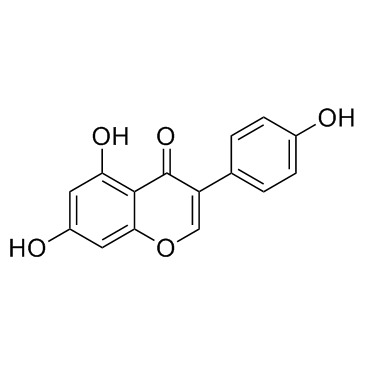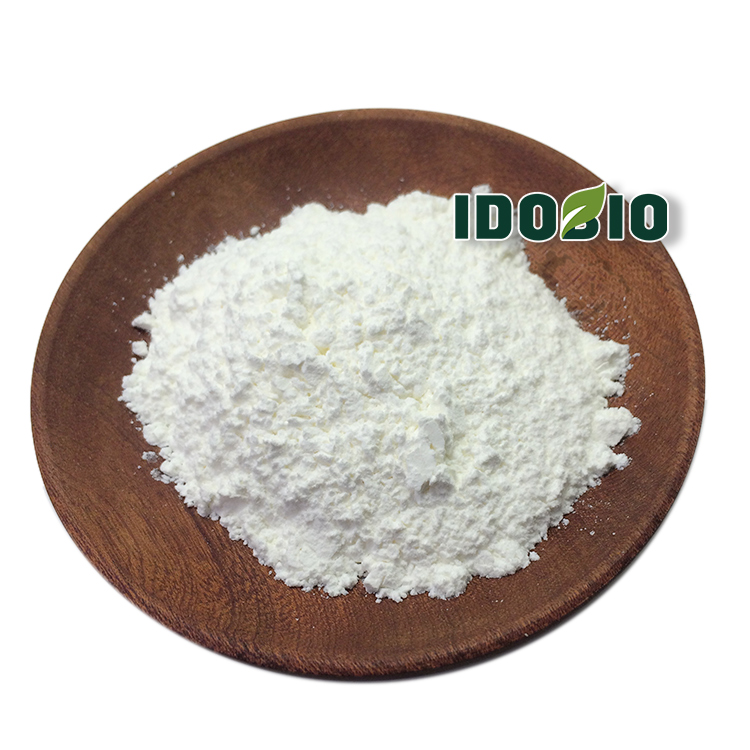Contact Us
For Product Pricing, Customization, Or Other Inquiries:
Contact Supplier
Call Us
Genistein 98%
English Name Genistein
CAS number 446-72-0
Molecular weight 270.237
Density 1.5±0.1 g/cm3
Boiling point 555.5±50.0 °C at 760 mmHg
Molecular formula C15H10O5
Melting point of 297-298 °C
Flash point 217.1±23.6 °C
Analysis Method: HPLC
Place of Origin:China
Packaging:1KG/Bag. 25kg/drums
The private label service:500g/1kg/ Aluminum foil bag
the Capsules OEM service; 0# Capsules 500mg/pcs. 2000pcs/kg in Vacuum bag
CAS number 446-72-0
Molecular weight 270.237
Density 1.5±0.1 g/cm3
Boiling point 555.5±50.0 °C at 760 mmHg
Molecular formula C15H10O5
Melting point of 297-298 °C
Flash point 217.1±23.6 °C
Analysis Method: HPLC
Place of Origin:China
Packaging:1KG/Bag. 25kg/drums
The private label service:500g/1kg/ Aluminum foil bag
the Capsules OEM service; 0# Capsules 500mg/pcs. 2000pcs/kg in Vacuum bag
Genistein, also known as fagin, dye isoflavones, is mainly an active ingredient extracted from legumes such as soybeans, clover, pueraria,
sophora flowers, genistein (broom) and broad bean root, known as phytoestrogens.
It has many pharmacological effects such as estrogen-like effect,
anti-tumor, anti-diabetes and prevention of cardiovascular diseases.
Genistein can induce programmed cell death, improve anti-cancer efficacy,
inhibit angiogenesis and so on.
English Name Genistein
CAS number 446-72-0
Molecular weight 270.237
Density 1.5±0.1 g/cm3
Boiling point 555.5±50.0 °C at 760 mmHg
Molecular formula C15H10O5
Melting point of 297-298 °C
Flash point 217.1±23.6 °C


Function
(1) It has estrogen and anti-estrogen properties.
(2) It has antioxidant effect.
(3) It can inhibit the activity of tyrosine protein kinase (PTK) [1]
(4) It can inhibit the activity of topoisomerase II.
(5) Can induce programmed cell death, improve anti-cancer efficacy, inhibit angiogenesis and other effects,
is a potential cancer chemoprevention agent, its anti-cancer effect and mechanism have a wide range of application prospects.
Application
It is used for anti-tumor, antibacterial, hypolipidemia and estrogen-like effects.
Antitumor effect
Inhibition of cell cycle: stop cells from G2/M phase; Inducing apoptosis of tumor cells: to promote apoptosis of tumor cells by upregulating related pro-apoptotic genes
and down-regulating corresponding anti-apoptotic genes, thus preventing and limiting the occurrence of tumor cells;
bacteriostasis
The bacteriostatic mechanism is realized by destroying the integrity of cell wall and membrane, inhibiting the TCA cycle pathway and protein synthesis.
This is consistent with Kim's view on the mechanism of antibacterial action of drugs
Because genistein has antibacterial and antioxidant physiological activities, from the perspective of nutrition,
if Gen is selected as a food additive, it can play its dual role, and the application prospect is very broad.
sophora flowers, genistein (broom) and broad bean root, known as phytoestrogens.
It has many pharmacological effects such as estrogen-like effect,
anti-tumor, anti-diabetes and prevention of cardiovascular diseases.
Genistein can induce programmed cell death, improve anti-cancer efficacy,
inhibit angiogenesis and so on.
English Name Genistein
CAS number 446-72-0
Molecular weight 270.237
Density 1.5±0.1 g/cm3
Boiling point 555.5±50.0 °C at 760 mmHg
Molecular formula C15H10O5
Melting point of 297-298 °C
Flash point 217.1±23.6 °C


Function
(1) It has estrogen and anti-estrogen properties.
(2) It has antioxidant effect.
(3) It can inhibit the activity of tyrosine protein kinase (PTK) [1]
(4) It can inhibit the activity of topoisomerase II.
(5) Can induce programmed cell death, improve anti-cancer efficacy, inhibit angiogenesis and other effects,
is a potential cancer chemoprevention agent, its anti-cancer effect and mechanism have a wide range of application prospects.
Application
It is used for anti-tumor, antibacterial, hypolipidemia and estrogen-like effects.
Antitumor effect
Inhibition of cell cycle: stop cells from G2/M phase; Inducing apoptosis of tumor cells: to promote apoptosis of tumor cells by upregulating related pro-apoptotic genes
and down-regulating corresponding anti-apoptotic genes, thus preventing and limiting the occurrence of tumor cells;
bacteriostasis
The bacteriostatic mechanism is realized by destroying the integrity of cell wall and membrane, inhibiting the TCA cycle pathway and protein synthesis.
This is consistent with Kim's view on the mechanism of antibacterial action of drugs
Because genistein has antibacterial and antioxidant physiological activities, from the perspective of nutrition,
if Gen is selected as a food additive, it can play its dual role, and the application prospect is very broad.






